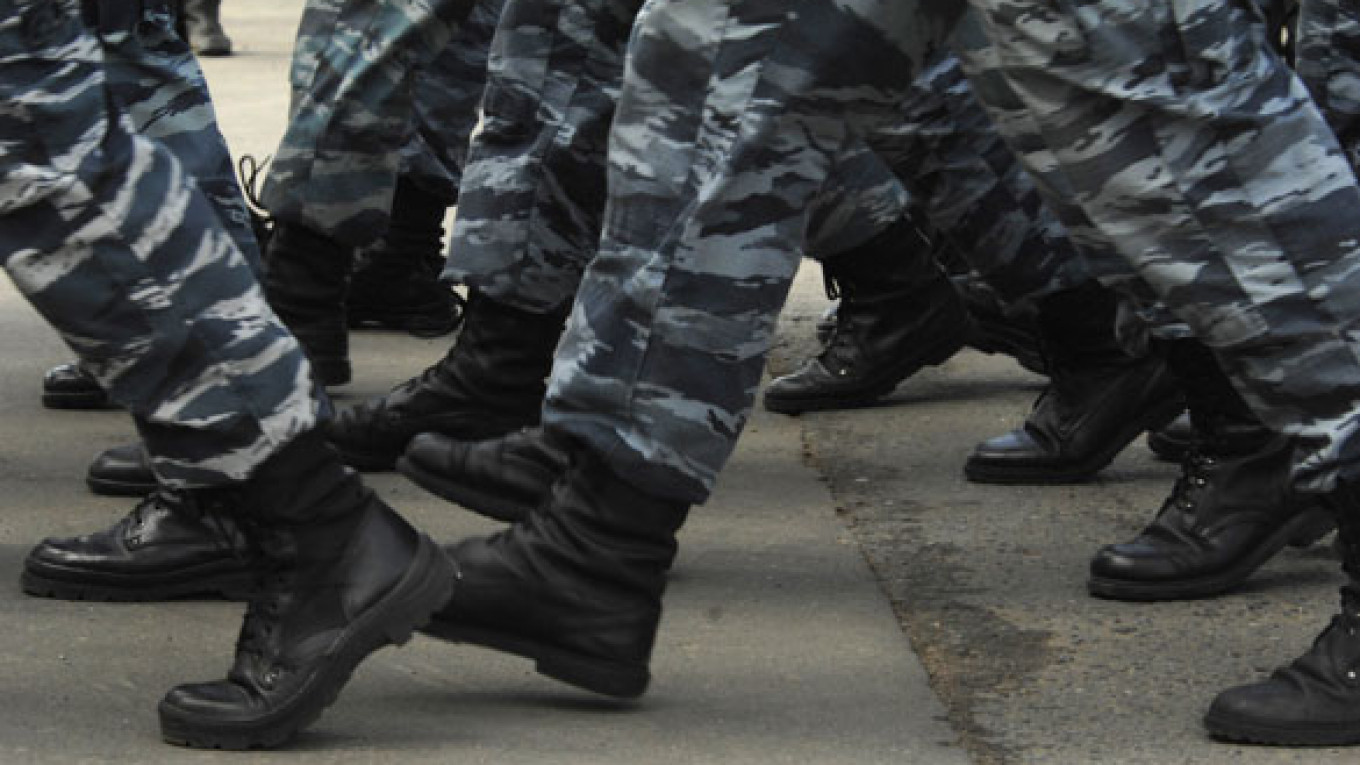Primorye authorities were on high alert Wednesday after a gang likened to "Russian Rambos" killed at least one policeman and injured several others in a monthlong campaign of self-described vigilante justice against corrupt law enforcement officers.
The attacks follow a spate of similar violence against Moscow police that could signal a worrisome shift in tactics by ultranationalists, who previously targeted dark-skinned migrants, analysts said.
Some news reports said Primorye authorities had cornered gang members in a forest in the far eastern region's Spassky district using helicopters and army tanks, and were ready to kill them if they refused to surrender.
But a senior Interior Ministry official later denied that any suspects had been cornered. “We do not have information at the moment that a part of the gang that assaulted police officers has been cornered in Primorye,” the unidentified official told RIA-Novosti.
He added that a search operation was in progress.
The Defense Ministry said no tanks or soldiers were involved in the operation, RIA-Novosti reported.
The wave of attacks started after Primorye police in April received unsigned letters demanding to end to the “lawlessness” of police officers, prosecutors and judges and threatening “cruel revenge” on law enforcement officers, Kommersant reported Wednesday.
Police ignored the threats, and the string of attacks soon followed, beginning with the torching of a police precinct in the village of Varfolomeyevka about two weeks after the letters arrived, local news site Vl.ru reported.
The perpetrators of the torching are also suspected of stabbing a police officer to death on May 27, attacking a police patrol on May 29, and shooting and wounding two policemen who stopped their car Tuesday, Interfax reported.
The police have found stashes of weapons prepared by the gang in the Spassky district forest but are unable to track the suspects among the trees, Vl.ru said.
The gang's leader is believed to be Roman Muromtsev, 32, a former army officer and a veteran of the Chechen campaign, and the group is thought to include five to 30 members.
Among the suspected members are Alexander Sladkikh, 19, Andrei Sukhorada, 22, Roman Savchenko, 18, and Alexander Kovtun, or Kavtun, 20, Vl.ru said, citing law enforcement authorties. Sukhorada and Kovtun were previously accused of assaulting Asian migrants, and Sladkikh is a conscript who deserted his unit, the report said.
Vladimir Savchenko, the father of one suspect, said his son, Sukhorada, and Kovtun were “driven over the edge” after police officers illegally beat them, according to Primamedia.ru, a Primorye news site.
The Movement Against Illegal Immigration, a nationalist organization, published on its web site Tuesday a statement credited to Muromtsev and addressed to Vladimir Kvachkov, a nationalist and former army officer accused of trying to kill Anatoly Chubais, the architect of Russia's 1990s privatizations who now heads Rusnano.
The statement said Muromtsev's “guerilla band” was fighting against “Jewish fascism” and “the lawlessness of the global shadow government that terrorizes our land.”
The authors of the statement call themselves “warriors of our Russia” who “have arisen against the evil that has enslaved our country and brought the Russian nation to its knees.”
Kommersant reported that the attacks might in fact be actions of timber dealers trying to take revenge on the police for terminating black market operations that they were involved in.
Whoever the attackers might be, they seem to be winning the support of the local population.
User comments posted on local web sites praised the attackers for fighting “petty police warlords,” and Newsru.com reported that the gang was viewed as a Russian answer to Rambo, the hero of the eponymous Hollywood movie who fought against corrupt police.
A seemingly unrelated string of attacks against police took place in April in Moscow, where five police buildings were torched by unknown assailants who posted videos of the attacks on a blog. They said the attacks were in response to police corruption.
A series of scandals in the notoriously corrupt and violent police force prompted President Dmitry Medvedev in December to declare a reform, which has yet to yield visible results.
A number of ultranationalists have recently declared that their new main target is the “regime,” not dark-skinned migrants, security expert Andrei Soldatov told The Moscow Times.
But it is too early to say whether the attacks in Moscow and Primorye mark the start of a trend of increasing violence against law enforcement officers because the motives of the Primorye gang remain unclear and might be linked to a business dispute, said Soldatov and Alexander Verkhovsky, director of the Sova Center, which studies nationalism and xenophobia.
“Attacks against the police have become a significant part of ultranationalists' activity since last year, but such incidents can still be counted on one's fingers,” Verkhovsky said.
A Message from The Moscow Times:
Dear readers,
We are facing unprecedented challenges. Russia's Prosecutor General's Office has designated The Moscow Times as an "undesirable" organization, criminalizing our work and putting our staff at risk of prosecution. This follows our earlier unjust labeling as a "foreign agent."
These actions are direct attempts to silence independent journalism in Russia. The authorities claim our work "discredits the decisions of the Russian leadership." We see things differently: we strive to provide accurate, unbiased reporting on Russia.
We, the journalists of The Moscow Times, refuse to be silenced. But to continue our work, we need your help.
Your support, no matter how small, makes a world of difference. If you can, please support us monthly starting from just $2. It's quick to set up, and every contribution makes a significant impact.
By supporting The Moscow Times, you're defending open, independent journalism in the face of repression. Thank you for standing with us.
Remind me later.


